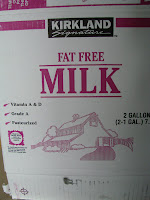We're starting a series at our church of scriptures selected by worship gathering participants that detail and lift up some the heros and heroines in the testimonial stories of the Bible that speak to them. This week is about Jesus and his radical hospitality and inclusivity.
In Luke 4 Jesus goes to Temple in his hometown and gets up to preach. He selects a part of the prophets (Isaiah 61:1-3) and then reads it in an experiential and connectional way. Jesus reads this prophecy of annointing to proclaim good news, the jubilee of God's favor, love and Shalom-peace and then promises that it's come true today in his reading and his person. The hometown crowd responds with a normal reaction, "Hey! Isn't that Jospeh's son? You know the carpenter on the street leading off of the town fountain? What's he thinking?"
They're surprised! Is it by Jesus' reading and interpretation? Is it that he dared say that? Or is it that they've been wondering as they've heard about some of the crazy things such as healings and puclic speaking to large crowds around not too far away...could it be true?
But then their surprise turns to anger and indignation. Jesus pushes the envelope. He proclaims what everyone had been waiting for...the revelation of the Jubilee, or salvation, or radical peace-making of God breaking into the world to become the ultimate reality. But then Jesus continues, saying that it's not just for the Jews - his own people - but for those pagan, unbelieving, Gentiles as well - those outsiders, the ones who are the "them" in the the whole there's "us" and there's "them" socio-ecnonomic cultural and ethnic conversation.
Jesus refers to two stories about the great prophets of yester-year: Elijah and Elisha, who represent some of the best and brightest of Jewish history, religion, culture and ethnicity. Yet Jesus alludes to two stories in which they go to help and save not Jews, but Gentiles, proclaiming and giving God's love first to the un-promised non-people of God before the promised and chosen people of God. Elijah brings the widow of Zarephath (a Gentile town and definitely a Gentile woman) back from the dead in
1 Kings 17 and the healing of Naaman (another Gentile and the leader of the ennemy army opposed to the Israelites in
2 Kings 5.
The home town crowd freaks out. "Who in the hell does this young freak think he is coming in here and saying this crap!?! *&%*! Jesus has told them what they fear...there is more than enough of God's love to go around to both the Israelites and everyone else (the Gentiles). The people of Jesus' day didn't believe that there was enough to go around. There were those that had been promised justice, deliverance and peace (the Israelites: the people of God) and then there was everyone else. It was clear. There were those who were "inside" and those who were "outside." There couldn't been enough to go around for everyone. There just wasn't enough.
The hometown crowd turns from indigantion to active violence. Luke tells us the faceless crowds mobs Jesus trying to throw him off a cliff. Only death could silence such comments worthy of eradication. So Jesus begins his ministry with both acclaim and rejection, in a moment of promise, prophecy and passion in which the crowd begs for more, dares to hope that just maybe this guy is the beginning of God's jubliee...and then they reject the radical extent to which he explains jubilee means and leads to. They have to kill him to silence such talk of inclusion, bridge-building, and peace-making. In a nutshell this story is representative of the larger, whole, story of who Jesus was, what he taught, and why he died and what his resurrection from among the dead means for Israelites, Gentiles, all of humanity and the cosmos.
So what does it mean for us? In his recently published memoires,
Alan Greenspan affirms that the war in Iraq is first and foremost about oil: the resource that seems to be the most scarce and precious in our world today. We fear not having enough of such limited and precious stuff so we do whatever to not just get some, but to try to control it to ensure our future, our protection, our stability, our familiar way-of-life. It's not that different. Theologian & Biblicist Walter Brueggemann writes about the Liturgy of Abundance and the Myth of Scarcity in the Bible testimony. (read the whole article
HERE or settle for my quickie summary and interpretation which follows) The Creation story is about abundance. God creates the world. It's all good. There's more than enough for everyone and every creature. It's a perfect system in which abundance is the norm and the thing that leads to gratitude and praise and worship of the benevolent creator of it all. As the stories continue fear, mistrust, jealousy, sin enters the story. Adam and Eve aren't sure if they're getting everything they deserve. Cain and Abel fight over who is the better one. Abraham is afraid of losing his own skin. Sarah doesn't want to lose her place, of for her son to be shamed. Issac prefers one son over other. Jacob cheats his way to what he wants. Joshua is screwed over by his jealous brothers. Then Pharoah who wants to reign over and control the whole world. All the stories point to the emergence of a human feeling, thought, perspective and fear that maybe, just maybe, there isn't enough to go around....maybe I won't get what I deserve, want, or expect as my piece of the pie....maybe God isn't just...maybe He's asleep on the job...so I should take matters into my own hands to ensure that things are fair, to speak for justice...to make sure that I get me some of whatever is it both today and in the days to come.
There is a movement from the Liturgy of Abundance to a Myth of Scarcity.
The pictures in the slide.com slideshow are from a photo album about what families eat for a week in places around the world and what they spend to do so. It's powerful, in particular contrasted with pictures of communion. I think we often act from the myth of scarcity....there's not enough food for coffee hour so everybody can only have one small little piece of cake...and then we're surprised to see how much is left over. It's usually my
daughter that goes up and takes a second and third piece...perceiving abundance where most of us adults suspect scarcity. Or how often do we say in our homes, "there's nothing to eat." When the truth is the opposite. I often multitask in every moment, worried that there won't be enough time to get everything done, be with my family, enjoy some down time, and succeed....so I end up like I was last night talking with my wife, watching TV, blogging, and doing paperwork all at the same time. My fear of scarcity leads me to not notice and walk around the abundance in which I'm already living. Recently I was in a worship gathering and the bread on the communion table was this tiny little loaf. Every piece was spoken for. There was only just enough to go around. There was one little cup for every person, but not extra for an unexpected visitor. How tragic it was! Not at all representative of what communion actually proclaims and enacts....the liturgy of abundance...the Jesus is himself the bread of life...not cubed on a tray...but abundant, life-giving, life-affirming, and resurrecting.
I think those folks in Nazareth were freaked out by the implication of having to let go of the myth of scarcity, the ways in which they controled life in order to feel secure, in order to move into a liturgy of abundance - the good news that God will provide, that God does provide. We do the same don't we? I know I do. I mistrust what I can't control, what I can't expect. I want things to fit into the box, and when they don't I suspect first that they're wrong. What does it mean to live good news? To recognize the abundance in which we literally live in our country, and from which we've always lived according to the creation myths of Genesis 1 and 2. How would it change my life, my day tomorrow if I started the day recognizing that there is more than enough to go around - that God gives manna every day - instead of from a fear of scarcity driving me to self-preservation at any cost? Isn't that the peace that we all are longing for, whether in the Middle East, in Oakland, in our families or our communities of faith - and even in our own personal lives? What greater message is there than that on World Communion Sunday when we affirm, proclaim and celebrate our unity: in both our human condition and need and our salvation and deliverance from such destructive sins of scarcity?
E-P-I-C Worship Ideas
How can we experience abundance in worship? And in doing so feel connected to others in our complicity with the sin and myth of scarcity and the abundance of God's love? Maybe have a communion table overflowing with food...more than could be eaten...so that it has to be shared with others, friends, family, neighbors?
Worship Planning Resources for WCS at Textweek.com HERE.
I took some photos for a great photo montage at Time.com entitled "What the World Eats" regarding what families around the world eat in one week. View it HERE. Could be a great powerpoint show to use in worship this week.











































